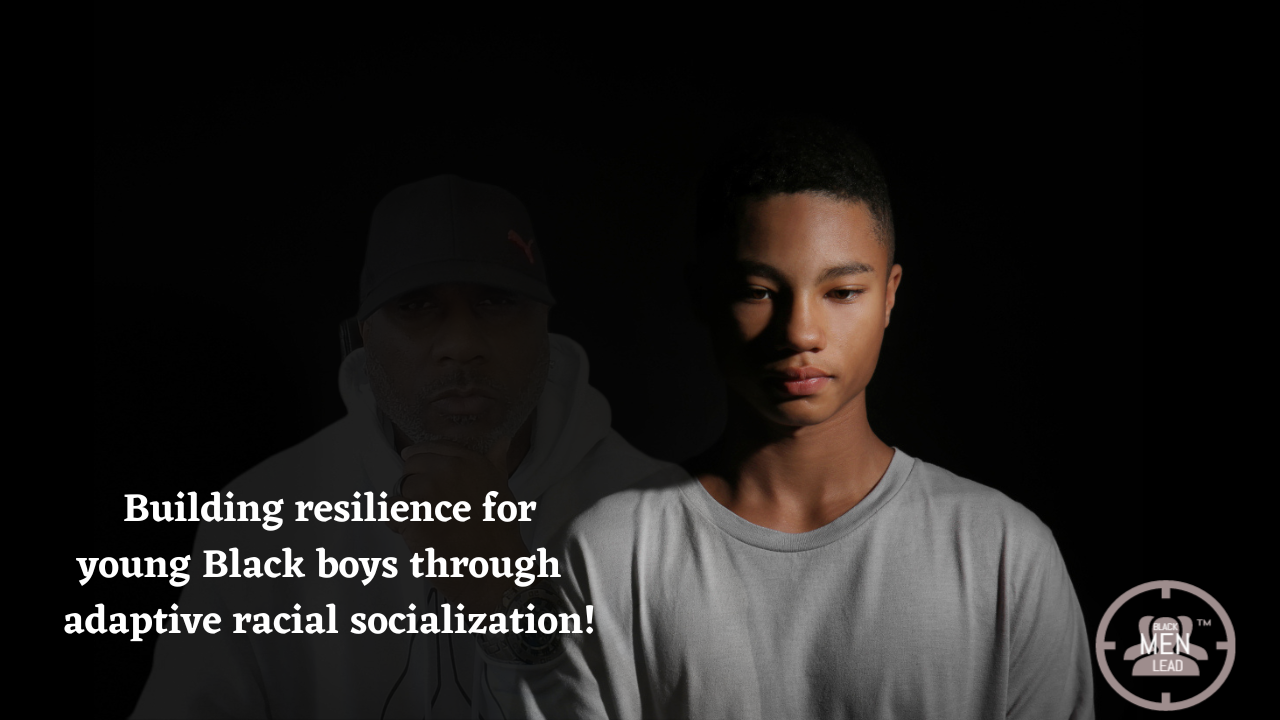The End of Mercury Retrograde Rare "Black" new super moon represents endless possibilities. On July...
The Importance of Racial Socialization for Black Boys
The Importance of Racial Socialization for Black Boys

Raising Black Children in the United States: Navigating Society’s Messages ~ The Power of Racial Socialization
Introduction
Raising black children in the United States comes with unique challenges rooted in the country’s history of racial inequality. As a result, parents need to prioritize racial socialization. Racial socialization involves communicating messages to children about race and its significance in society. These messages can take different forms, including emphasizing pride in being black, warning about racial inequalities, and deemphasizing the importance of race (deemphasizing the significance of race can easily backfire because it can eliminate the power of racial identity). This article explores the different types of racial socialization messages, their importance for black boys, the multidimensional model of racial identity, and strategies for adequate racial socialization.
Types of Racial Socialization Messages
Parents can communicate different messages to their children about race. One type of message emphasizes pride in being black. This message involves teaching children about the contributions of black people to society, highlighting black culture, and promoting a positive self-image.
Another type of message is warning Black children about racial inequalities. This message involves educating children about discrimination, racism, and social injustice. Parents who use this type of message often encourage their children to be aware of their surroundings and to take preventive measures to avoid negative experiences.
A third type of message is deemphasizing the importance of race. This approach, sometimes called a “color-blind” approach, involves downplaying the significance of race and encouraging children to see people as individuals rather than members of a particular racial group. However, this approach can be problematic because it ignores the reality of racial disparities and the impact of racism on people’s lives.
A fourth type of message is mistrust of other ethnic groups. This message involves promoting a sense of loyalty to one’s own racial group and caution towards members of other groups.
Finally, silence about race and racial issues is another type of message. This approach involves avoiding conversations about race and its significance in society.
The Importance of Racial Socialization for Black Boys
Racial socialization has significant benefits for black boys. One of the benefits is reducing the propensity for violence. Research has shown that black boys who receive racial socialization messages are less likely to engage in violent behavior.
Racial socialization also increases the chance of academic success. Children who receive messages promoting a positive self-image and pride in their racial identity are more likely to perform well in school.
Additionally, racial socialization reduces incarceration rates. Studies have shown that black boys who receive racial socialization messages are less likely to be involved in the criminal justice system.
Empirical data links racial socialization messages to higher adaptive coping with discrimination. Children who receive racial socialization messages are better equipped to deal with discrimination and racism when they encounter them. Racial socialization has also been linked to racial identity, which is an important factor in promoting positive mental health outcomes among black boys.
More About Racial Identity
Black boys face unique challenges in education that are often rooted in issues of racial identity. These challenges can have long-lasting effects on their academic success and overall well-being. In this blog post, we will explore why racial identity is so vital for Black boys and what educators and parents can do to support them.
First, I will examine the research on the impact of racial identity on academic achievement. Then, we will discuss the ways in which Black boys are often marginalized in education and how this affects their sense of self. Finally, I will explore strategies for promoting positive racial identity development in Black boys.
Through this exploration, I hope to shed light on the importance of racial identity for Black boys and to provide practical guidance for those who work with them.
The Impact of Racial Identity on Academic Achievement
Research has consistently shown that a strong sense of racial identity is positively associated with academic achievement for Black students. In a study by Osajima (2001), Black students who reported higher levels of racial identity had higher GPAs and were more likely to be on track for graduation.
Similarly, a study by Stevenson et al. (2014) found that Black students who had a sense of pride in their racial identity were more likely to have positive academic outcomes, such as higher grades and greater motivation to succeed.
These findings highlight the importance of promoting positive racial identity development in Black boys as a means of supporting their academic success.
The Marginalization of Black Boys in Education
Despite the clear benefits of promoting positive racial identity development, Black boys often face marginalization in education. They are more likely to be suspended, expelled, or placed in special education programs than their peers (Howard, 2008). They are also less likely to be identified as gifted or talented, despite research showing that they are just as likely to exhibit these traits as their white peers (Ford & Grantham, 2003).
These patterns of marginalization can have negative effects on Black boys’ sense of self-worth and their academic aspirations. They can also perpetuate stereotypes and biases about Black boys, leading to further discrimination and marginalization.
Promoting Positive Racial Identity Development
Given the challenges that Black boys face in education, it is crucial that educators and parents take active steps to promote positive racial identity development. Here are some strategies that can be effective:
- Expose Black boys to diverse role models who are successful in various fields.
- Encourage Black boys to explore their cultural heritage and learn about their ancestors.
- Provide opportunities for Black boys to engage in culturally relevant activities, such as music, dance, or art.
- Teach Black boys about the history of racism and discrimination, and help them understand the ways in which these forces continue to impact their lives.
- Encourage Black boys to express themselves creatively and to take pride in their unique talents and abilities.
The Role of Literature in Promoting Positive Racial Identity
Literature can play a powerful role in promoting positive racial identity development for Black boys. When Black boys see themselves reflected in the stories they read, it can help them to feel seen, heard, and valued. At the same time, exposure to diverse perspectives can help to broaden their understanding of the world and increase their empathy for others.
Unfortunately, children’s literature remains overwhelmingly white, with only a small percentage of books featuring Black protagonists (Cooperative Children’s Book Center, 2021). This lack of representation can have negative effects on Black boys’ sense of self and their motivation to read.
Multicultural Literature as Mirrors and Windows
Rudine Sims Bishop (1990, 1997) is credited with coining the phrase and notion of multicultural literature as mirrors for children of color to see themselves reflected in what they read. Such representation must be what we refer to as ‘R2 E2 A2 L’-- relevant, rigorous, empowering, engaging, accurate, affirming, and liberating.
Black boys need literature that not only reflects their experiences but also challenges them to think critically about the world around them. They need literature that is empowering and affirming but also acknowledges the challenges they face as Black boys in a society that often marginalizes them.
Examples of Multicultural Literature for Black Boys
Here are some examples of multicultural literature that can be powerful mirrors and windows for Black boys:
- The Crossover by Kwame Alexander
- Bud, Not Buddy by Christopher Paul Curtis
- The Watsons Go to Birmingham--1963 by Christopher Paul Curtis
- Roll of Thunder, Hear My Cry by Mildred D. Taylor
- The First Step: How One Girl Put Segregation on Trial by Susan E. Goodman
Black boys’ sense of racial identity is crucial for their academic success and overall well-being. Unfortunately, they often face marginalization in education, which can have adverse effects on their sense of self-worth and motivation to succeed. It is vital for educators and parents to take active steps to promote positive racial identity development, including exposing Black boys to diverse role models, providing opportunities for cultural exploration, and incorporating multicultural literature into their reading diet.
By doing so, we can help create a world in which Black boys feel seen, heard, and valued and can achieve their full potential.
The Multidimensional Model of Racial Identity
The multidimensional model of racial identity is a framework that explores the different dimensions of racial identity. The model includes four dimensions: racial centrality, private regard, public regard, and ideology. Racial centrality refers to the extent to which race is an important part of one’s self-concept. Private regard refers to the extent to which one feels positive about being a member of their racial group. Public regard refers to the extent to which one believes others view their racial group positively. Ideology refers to the extent to which one supports or rejects the values and beliefs of their racial group. The multidimensional model of racial identity has important implications for racial socialization. For example, parents who want to promote a positive self-image in their children can focus on messages that increase private regard. Parents who want to promote a sense of belonging and connectedness to their racial group can focus on messages that increase racial centrality. Additionally, parents who want to promote a critical understanding of race and its impact on society can focus on messages that increase ideology.
Racial Socialization in Practice
Racial socialization can occur intentionally or unintentionally. Intentional racial socialization involves parents deliberately communicating messages about race to their children. Unintentional racial socialization involves parents’ behaviors and attitudes towards race that are communicated to their children indirectly. For example, a parent who avoids conversations about race is unintentionally communicating a message that race is not important.
Strategies for effective racial socialization include starting conversations about race and racism, promoting a positive self-image, and exposing children to diverse media and experiences. However, there are also challenges and barriers to racial socialization, including the lack of resources and support, the fear of perpetuating negative stereotypes, and the difficulty of navigating complex racial dynamics.
Conclusion
In conclusion, racial socialization is critical to raising black children in the United States. The urgency is even greater for Black boys. When I created the Black Men Lead rite of passage initiative for Black boys, the goal was to provide a universal rite of passage that clarified the role of being a Black man in a way that encouraged pride and responsibility. While the program is holistic in approach, it is built on 11 foundational principles that include:
- Never harms, mistreats, or disrespects a Black woman (including females of all ages)
- Takes care of his progeny (offspring)
- Always has control of his emotions
- Works so that he can provide for his family
- Strives to build wealth for his family and offspring
- Understands the importance of ownership of businesses and property
- Is always in a state of learning and growing
- Takes responsibility for his own actions
- Seeks wisdom and knowledge from men in great situations and conditions
- Abides by a standard of excellence -- never settling
- Never makes excuses for his failures --- making the necessary adjustments to overcome them
Support the Black Men Lead Rite of Passage Initiative

On a Broader Scale, the Black Men Lead program will address many issues, including:
- Addressing the Identity Crisis that has plagued us for generations
- Integrating proper racial socialization
- Confronting Emotional Mental Stressors in Teens and Adult Males (A New National Focus)
- Developing a desire to lead and protect our women and children
- Addressing environmental challenges and peer influences
- Dealing with the fears and anxieties that most are afraid or ashamed to discuss
- Developing and understanding that nothing is greater than purpose & destiny
- Acknowledge that there are obstacles and challenges, but we are built for them
- Address fears and concerns
- Explain and emphasize the dangers of drug use and the destruction it causes
- Confront the propensity for violence (Explaining the rise in aggression during adolescence and beyond --- revealing that this aggression that is a response to a rise in testosterone levels is actually preparing them to be protectors of their communities --- not destroyers.
- Setting High Expectations
- The standards have been set too low. We will raise the demands and expectations for our male youth.
- Teaching them that they can not only prosper in this hostile environment but also thrive in it, win in it, dominate in it...
- Instill the proper attitude and mindset as it pertains to money and the building of generational wealth
- Emphasizing the importance of developing the ability to communicate effectively and how it will open doors for them
- Highlighting the power of an intelligent mind
- Clarifying the Possession of Power
- Teaching them that they are always in control of their destiny because they control their decisions
- Focusing on the importance of developing the capacity to control their emotions and passions and not allowing these forces to control them
- That women are the greatest test of their manhood in more ways than one, and they must be up to the test
- How to maintain control over sexual compulsions that could place them in unfavorable positions
- Teaching Them That They are In Charge of Their Lives
- Stop looking outside of themselves for validation and acceptance
- The principles of internal and external authority
- Leaving the quitter behind
- Recognizing the Enemy
- How to understand the environment and surroundings they are operating in --- being diligent in examining all who they encounter
- Defining the parameters of friend and foe --- stop judging based on emotion and feelings
- Understand and respect differences in cultures while always honoring and protecting your own
- The Foundation of Faith
- Developing a solid moral and ethical code
- Understanding that change is inevitable and they are built to adapt and dominate, despite the vicissitudes and changes that are sure to come
- Die on "E"
The mission is clear. We must become more effective in racially socializing our youth, especially our boys. Their future and the future of the Black races depend heavily upon it.
Support the Black Men Lead Rite of Passage Initiative

References
Benner, A. D., & Graham, S. (2013). The antecedents and consequences of racial/ethnic discrimination during adolescence: Does the source of discrimination matter? Developmental Psychology, 49. 1602-1613. doi: 10.1037 / a0030557.
Butler-Barnes, S. T., Richardson, B. L., & Chavous, T. M. (2019). The Importance of Racial Socialization: School-Based Racial Discrimination and Racial Identity Among African American Adolescent Boys and Girls. Journal of Research on Adolescence, PMID: 29504688 DOI: 10.1111/jora.12383.
Coutinho, M. J., & Oswald, D. P. (1999). Ethnicity and Special Education Research: Identifying Questions and Methods. Behavioral Disorders, 66-73.
Coutinho, M. J., & Oswald, D. P. (2000). Disproportionate Representation in Special Education: A Synthesis and Recommendations. Journal of child and Family Studies, 135-156.
DeGruy, J. (2005). Post Traumatic Slave Syndrome. Portland, OR: Joy DeGruy Publications Inc.
DeGruy, J. (2009). The African American Adolescence Respect Scale: The Measure of Prosocial Attitude. The University of Portland, 1-3.
Rogers, L. O., Scott, M. A., & Way, N. (2015). Racial and Gender Identity Among Black Adolescent males: An Intersectionality Perspective. Society for Research in Child Development, Vol. 86, No. 2 (MARCH/APRIL 2015), pp. 407-424.
Stevenson, H. C. (2006). Parents' Ethnic-Racial Socialization Practices: A Review of Research and Directions for Future Study. American Psychological Association, 1-24.
Stevenson, H. C. (2014). Promoting Racial Literacy in Schools. Columbia, SC: Teachers College Press.
Stevenson, H. C. (2015). Development of the Teenager Experience of Racial Socialization Scale: Correlates of Race-Related Socialization Frequency from the Perspective of Black Youth. The Journal of Black Psychology.
Wallace, D. (2007). Black Male Gender Role Socialization and the Performance of Masculinity in Love Relationships. Department of AFrican American Studies at Temple University.
Wallace, R. (1988). A synergism of Plagues, Planned Shrinkage, Contagious Housing Destruction, and Aids in the Bronx. Journal for Environmental Resources.
Wallace, R. (2011). Benign Neglect and Planned Shrinkage. Brookly History.
Wallace, R. (2015). Collective Cognitive-bias Reality Syndrome. The Odyssey Project Research Center.
Wallace, R. (2015). The Miseducation of African American Youth: The Final Move on the Grand Chessboard. New York, NY: etteloc Publishing.
Wallace, R. (2016). Racial Trauma & African Americans. The Odyssey Project Research Center.
Wallace, R. (2017). Born in Captivity: Psychopathology As a Legacy of Slavery. Houston, TX: Odyssey Media Group & Publishing.
Wallace, R. (2017). Why Blacks Cannot Simply Escape the Legacy of Slavery. The Odyssey Project Research Center.
Wallace, R. (2020). The Undoing of the African American Mind. Houston: Odyssey Media Group & Publishing.
Wallace, R. (2021). Academic Apartheid: Special Education Disproportionality Against Black Boys & More. Houston : Odyssey Media Group & Publishing.
Wright, B. L., & James L. Moore III, D. F. (2022). Affirming Black Boys' Identity. Diverse Issues in Higher Education.





